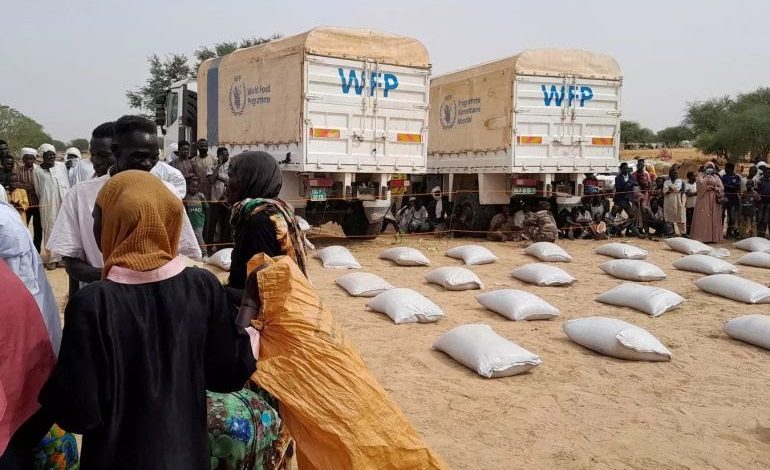Sudan to open border crossing for famine relief

Sudan Events – Agencies
Seasonal rains have closed the Tine border crossing between Chad and Darfur while fighting has cut off east-west routes from Port Sudan to Darfur.
Sudan’s military government decided today to open the Adré border crossing for a three-month period, a sign that coordinated international pressure could be working to influence the regime, despite its decision to boycott ceasefire talks in Geneva.
The decision came one day after the start of U.S.-led diplomatic talks in Geneva, which coincided also with a flurry of diplomatic activity in Port Sudan, the de facto capital of the beleaguered military government following its retreat from Khartoum.
Located on the border between eastern Chad and Sudan’s famine-struck western Darfur region, Adré is a key port of entry for waiting relief supplies provided by the UN World Food Programme and other aid agencies.
Previously, Sudan’s government agreed to let aid agencies use the Tine crossing farther to the north, but heavy rains and seasonal flooding closed this route last month, stranding thousands of tonnes of relief supplies in eastern Chad.
The regime does not militarily control the Adré crossing and it was reluctant to let aid agencies bring food into territory controlled by the rebel paramilitary, the Rapid Support Forces (RSF), for fear that this could help them.
Repeated appeals by international aid agencies and donor governments were ignored until today, when the Transitional Sovereignty Council issued a statement directing the opening of the crossing and granting a role to Qatar to coordinate the matter:
“The Transitional Sovereignty Council decided in its regular meeting today, headed by Lieutenant General Abdel Fattah Al-Burhan, to direct the Humanitarian Aid Commission, in coordination with the Qatari Humanitarian Aid Coordinator, to open the Adré border crossing for a period of the months according to the known and agreed upon controls, in order to ensure the delivery of humanitarian aid to affected citizens.”
The decision implies that after three months—coinciding with the end of rainy season—aid agencies will revert to using the Tine crossing, which is an area under the influence of the ex-rebel “Joint Force,” which is allied with the Sudan Armed Forces.
The day before this decision, Wednesday, Qatar’s military dispatched two aircraft to Port Sudan carrying 27 tonnes of humanitarian supplies. Qatar, Egypt, the United States, and European nations have intensified their diplomatic contacts with Sudan’s military government ahead of proposed peace talks in Geneva.
Sudan’s military ruler Abdel Fattah Al Burhan received a phone call Thursday from U.S. Secretary of State Anton Blinken to discuss the Geneva talks. Earlier in the day, Al-Burhan met Norway’s Ambassador Endre Stiansen. On Tuesday, Egypt’s ambassador met with two other members of the military junta, coinciding with a visit by an Egypt media delegation. Earlier, Egypt’s foreign minister had met Al-Burhan in Rwanda. These meetings all focused on the Geneva talks and humanitarian matters.
The UN World Food Programme celebrated the news of the opening of the Adré crossing, saying that they would take “immediate action” to bring supplies into Darfur.
Meanwhile, in Geneva, the United States yesterday and today held consultations with representatives of regional powers and international bodies, while calling on the Sudan Armed Forces to send a delegation to Geneva to negotiate a ceasefire.
The African Union, Arab League, Egypt, Qatar, the United Arab Emirates, and United Nations Secretary-General have sent representatives to the Geneva talks, which are co-hosted by Switzerland and Saudi Arabia.
U.S. Special Envoy Tom Perriello said, “Our first day of discussions, including small-group focused meetings with technical experts, have already yielded concrete ideas for compliance and execution of parties’ Jeddah Declaration commitments. Discussions will continue tomorrow.”
He was referring to a declaration of principles made by the warring parties last year in Jeddah, which neither side adhered to. Perriello added that the diplomatic talks continued today, August 15, saying, “We continue our relentless work with international partners to save lives and ensure we achieve tangible results that build upon the Jeddah Process and implement the Jeddah Declaration.”
One of Sudan’s warring parties, the RSF, sent a delegation to Geneva while the Sudanese military did not send a delegation. So far, the diplomats hosting the event haven’t held made any public appearance with the RSF delegation, instead choosing to highlight the talks among diplomats, portraying a unified front in support of a ceasefire in the war-torn nation.
The Geneva initiative contrasts with diplomatic efforts last year, which involved less coordination and consensus among various parties, as Egypt, IGAD, USA and Saudi Arabia, and the African Union all undertook disparate efforts to address the crisis.



